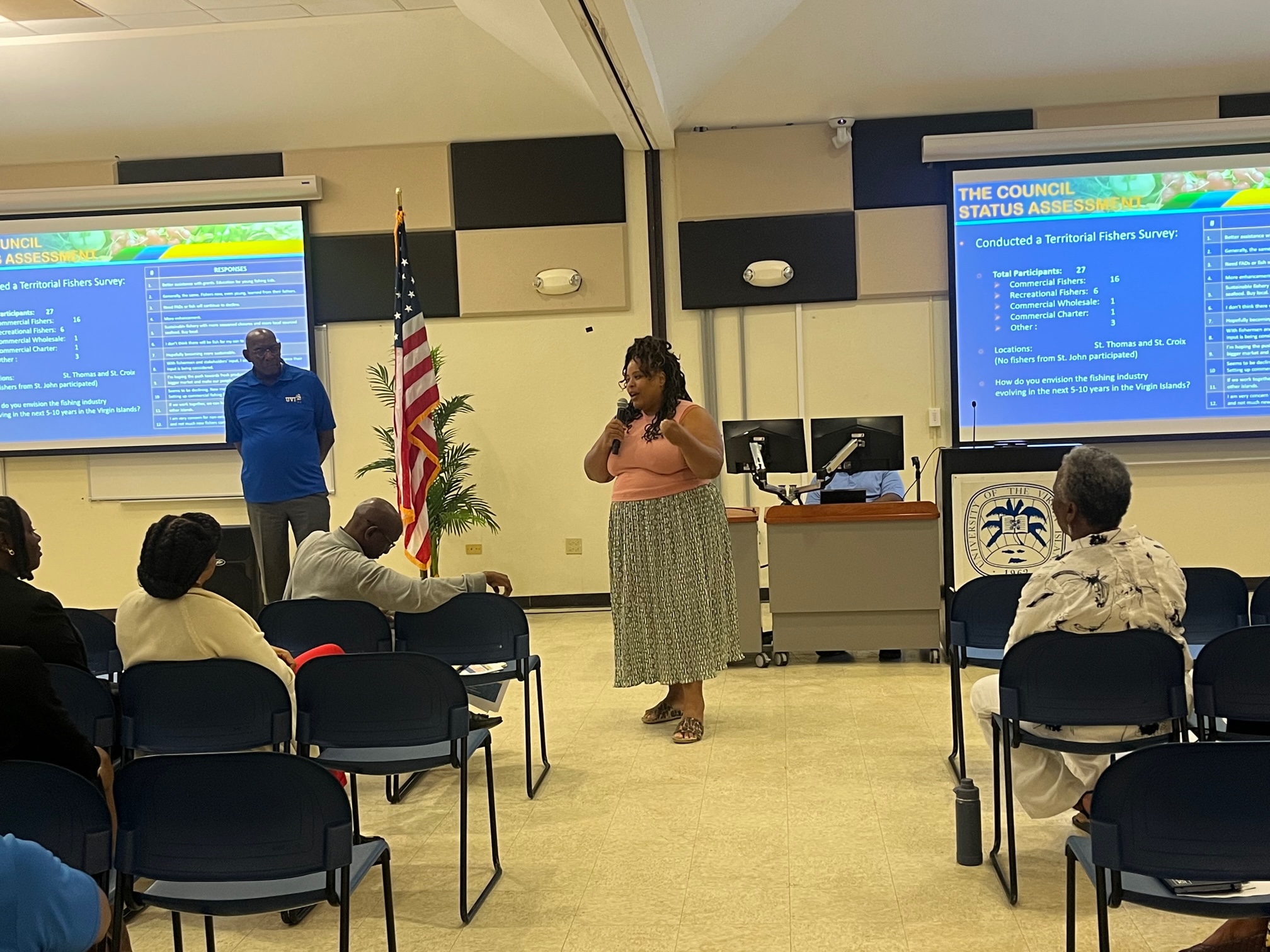
The Local Food and Farm Council provided an update on their $500,000 funding and other new developments. The town hall-style meeting, which took place on Wednesday at the University of the Virgin Islands, Albert Sheen Campus, attracted about 20 attendees.
Due to technical difficulties, virtual selection was no longer an option. The Local Food and Farm Council invited the community to participate in island-specific town halls. The intent was to share progress on executing the territorial Agricultural Plan for farmers and fishers and discuss the next steps. Other town halls took place on St. John and St. Thomas earlier in April.
President of the University of the Virgin Islands, David Hall, said that the Local Food and Farm Council requested $3 million from the Senate to execute the Territorial Agriculture Plan. However, they were only able to secure $500,000. The 2021 plan, which dates back to 1999, has eight mandates and covers both farmers and fishers.
The implementation of the Agricultural Plan represents a significant step towards realizing the vision of food security in the territory, where, according to the United Nations Food and Agricultural Organization, currently 97 percent of the food supply is imported.
“If we really want productivity to increase then we have to invest in various individuals. We have to make sure that there are resources available for that growth. What we are doing with the significant part of that half a million is to receive applications from farmers and fishers about how an investment in their operation can increase their productivity,” Hall said.
“The other purpose is that we were told that there are times when an individual farmer is attempting to obtain a federal grant. That federal grant requires a matching portion,” he said.
In order for farmers and fishers to qualify for funding there is an online application process. The application is divided into two tiers of funding:
- “Tier 1” is suitable for beginning farmers or fishers with 0-5 years of business experience. Funding ranges from $25,000 – $100,000.
- “Tier 2” is designed for experienced farmers or fishers with five or more years of business experience and ranges from $40,000 – $100,000.
To be eligible, an applicant must be 18 years or older, a legal resident of the U.S. Virgin Islands, must be a legally registered business or organization operating in the U.S. Virgin Islands, and must demonstrate active involvement in the agriculture or fishing industry or within the territory.
Later, Hall discussed the application process and the website.
To access the application click here.
All applications can be submitted to vilocalfoodandfarmcouncil@doa.vi.gov by May 31. Funding decisions will be made at the end of July.
Earlier in the year the Agriculture Business Centers were launched on all three islands. Executive Director Shay Roberts was chosen to carry out its function. “When you go to the business centers there will be individuals there to assist you and to guide you through the process,” said Hall.
This includes filling out the online application. To schedule an appointment farmers and fishers can do so online at www.myviabc.org. There is no cost to visit the Agriculture Business Centers.
The first Local Food and Farm Council Coordinator, Sommer Sibilly-Brown, who has worked for 12 years in support and advocacy for farms and has an extensive background in agriculture, was also introduced.
Other updates included the Local Food and Farm Council logo designed by local artists. During the meeting, sticker logos were provided, and Hall challenged farmers to use the logos as a way of branding locally grown products. Also announced were intentions to begin seven school pilot implementations of curriculum and outreach programs for students to start this fall. A director of sustainability has also been selected to ensure that the seven selected schools on St. Croix, St. Thomas, and St. John are in compliance; that person is waiting on the governor to provide his final signature.
During the question-and-answer portion, a farmer audience member expressed concern that farmers would have to share the funding with fishermen who received it in response to hurricanes Irma and Maria in 2020.
“Here you have farmers 200 plus competing for a $500,000 grant,” said the audience member. “The only thing I can say is we can only distribute what we were given. The idea of this fund did not grow out of Irma and Maria. This was a concept in the agriculture plan of how we can grow businesses. I am the first to agree that it’s not enough to do what we need to, but we are going to do our best to be fair to both entities,” Hall responded.
The Agricultural Plan was approved and endorsed by Gov. Albert Bryan Jr. and ratified by the 34th Legislature of the Virgin Islands, with funding appropriated early last year through ACT 8700. The Agricultural Plan Task Force, which crafted the plan, then passed the baton to the Local Food and Farm Council, which is charged with its execution.
For more information or to share feedback, please contact 340-693-1003 or email vilocalfoodandfarmcouncil@doa.vi.gov.


